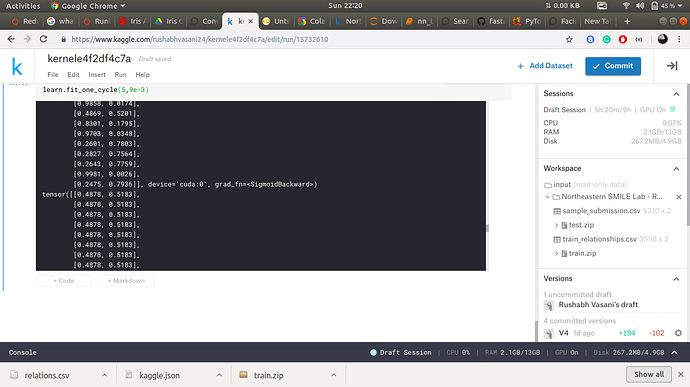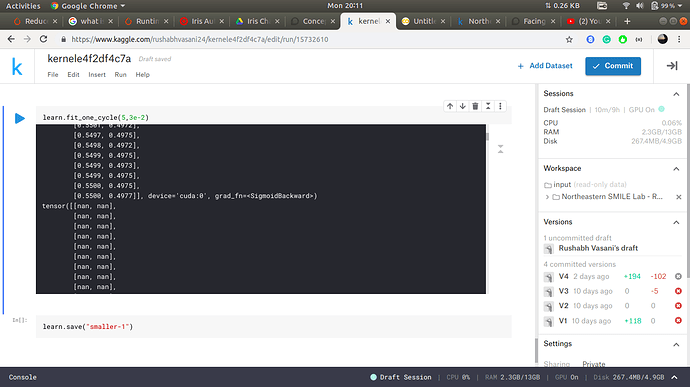Hi @dreambeats!
I have made another account in google colab and my code is running on GPU in that account(Maybe my original account’s packages had a problem.)
And now I have found the exact location of the problem.
Whenever it runs on GPU it gives the same output all the time but while running on CPU it gives the outputs properly.
This is How I am creating the dataset. Df is a dataframe where p1 are paths to image 1, p2 are paths of image 2 and Relativity is column of labels.
class MyDataset(Dataset):
def __init __(self, Df ,istest=False):
self.X1=list(Df.p1)
self.istest=istest
self.X2=list(Df.p2)
if not self.istest:
self.y=list(Df.Relativity)
def __len__(self):
return len(self.X1)
def batch_stats(self, funcs:Collection[Callable]=None, ds_type:DatasetType=DatasetType.Train)->Tensor:
funcs = ifnone(funcs, [torch.mean,torch.std])
x = self.one_batch(ds_type=ds_type, denorm=False)[0].cpu()
return [func(channel_view(x), 1) for func in funcs]
def normalize(self, stats:Collection[Tensor]=None, do_x:bool=True, do_y:bool=False)->None:
if getattr(self,'norm',False): raise Exception('Can not call normalize twice')
if stats is None: self.stats = self.batch_stats()
else: self.stats = stats
self.norm,self.denorm = normalize_funcs(*self.stats, do_x=do_x, do_y=do_y)
return self
def __getitem__(self, idx):
if self.istest:
return [reshape_image(trans(Image.open(self.X1[idx]))), reshape_image(trans(Image.open(self.X2[idx])))]
return [reshape_image(trans(Image.open(self.X1[idx]))), reshape_image(trans(Image.open(self.X2[idx])))] , torch.tensor([self.y[idx],torch.tensor(pow((int(self.y[idx])-1),2),dtype=torch.float)])
An this is my model:
class MultInputNN(nn.Module):
def __init __(self):
super(MultInputNN,self).__init __()
self.model=nn.Sequential(
nn.Conv2d(3, 8, kernel_size=3, stride=2, padding=1),
nn.BatchNorm2d(8),
#nn.ReLU(),
nn.Tanh(),
nn.Conv2d(8, 16, kernel_size=3, stride=2, padding=1),
nn.BatchNorm2d(16),
#nn.ReLU(),
nn.Tanh(),
nn.Conv2d(16, 28, kernel_size=3, stride=2, padding=1),
nn.BatchNorm2d(28),
nn.ReLU(),
nn.Conv2d(28, 48, kernel_size=3, stride=2, padding=1),
nn.BatchNorm2d(48),
nn.ReLU(),
nn.Conv2d(48, 64, kernel_size=3, stride=2, padding=1),
nn.BatchNorm2d(64),
nn.ReLU(),
nn.Conv2d(64, 64, kernel_size=3, stride=2, padding=1),
nn.BatchNorm2d(64),
nn.ReLU(),
nn.Conv2d(64, 72, kernel_size=3, stride=2, padding=1),
nn.BatchNorm2d(72),
nn.ReLU(),
nn.Conv2d(72, 80, kernel_size=3, stride=2, padding=1),
nn.ReLU(),
)
self.model2=nn.Sequential(
nn.Linear(160,80),
nn.ReLU(),
nn.Linear(80,80),
nn.ReLU(),
nn.Linear(80,64),
nn.ReLU(),
nn.Linear(64,28),
nn.ReLU(),
nn.Linear(28,28),
nn.ReLU(),
nn.Linear(28,16),
nn.ReLU(),
nn.Linear(16,2),
nn.Sigmoid()
)
for params in self.model:
params.requires_grads=True
for params in self.model2:
params.requires_grads=True
def forward(self, input1, input2):
c1=self.model(input1)
c2=self.model(input2)
combined = torch.cat((c1.view(c1.size(0), -1),
c2.view(c2.size(0), -1)), dim=1)
output=self.model2(combined)
return output
Edited: GPU is also not the problem.
My loss function is leading it to the direction of being disconnected from the inputs. So first it starts giving similar kind of outputs and after more training it gives the same output.
nn.BCELoss is giving me the error “RuntimeError: bool value of Tensor with more than one value is ambiguous”.
So,I had used mse. And now I used rmse which is a little bit better than mse.

